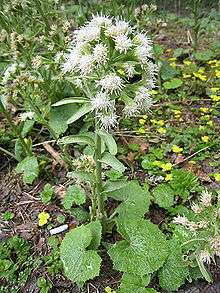Petasites albus
| Petasites albus | |
|---|---|
 | |
| Scientific classification | |
| Kingdom: | Plantae |
| Order: | Asterales |
| Family: | Asteraceae |
| Genus: | Petasites |
| Species: | P. albus |
| Binomial name | |
| Petasites albus (L.) Gaertn. | |
Petasites albus, the white butterbur,[1] is a flowering plant species in the daisy family Asteraceae. It is native to central Europe and the Caucasus.
Description
Petasites albus is a perennial rhizomatous herb, with large suborbicular leaves covered with lax cottony hairs. The flower heads are compact racemes of composite floweres or capitula with white ligules. They are dioecious, the male plants often more common than the females, as in the British range. [2]:771
Distribution
The native range of Petasites albus is the mountains of central Europe and the Caucasus. It was first recorded in Sweden in Skåne in 1737 (Nordstedt 1920). [3] In the British Isles it is a neophyte, introduced by the 17th century and naturalized in Yorkshire by 1843, but now predominantly distributed in North-east Scotland.[4]
Habitat
It prefers damp soils in deciduous forests, mountain pastures, springs and streamsides, roadside verges and other areas of rough ground.[3][2]

References
- ↑ "BSBI List 2007". Botanical Society of Britain and Ireland. Archived from the original (xls) on 2015-02-25. Retrieved 2014-10-17.
- 1 2 Stace, C. A. (2010). New Flora of the British Isles (Third ed.). Cambridge, U.K.: Cambridge University Press. ISBN 9780521707725.
- 1 2 Anderberg, Arne. "Den Virtuella Floran: Petasites albus (L.) Gaertn.". Naturhistoriska riksmuseet, Stockholm.
- ↑ "Online Atlas of the British Flora. Petasites albus (White Butterbur)". Wallingford, Oxfordshire, U.K.: Biological Records Centre.
| Wikimedia Commons has media related to Petasites albus. |